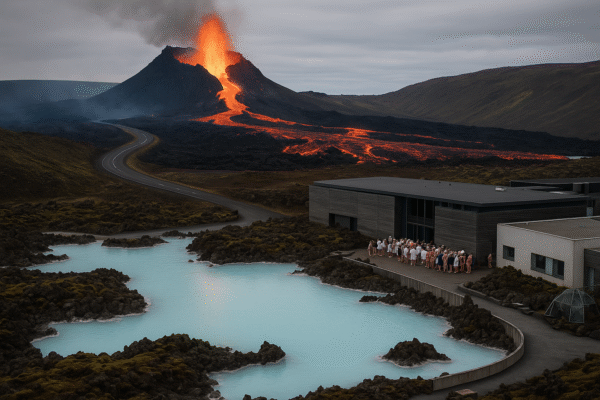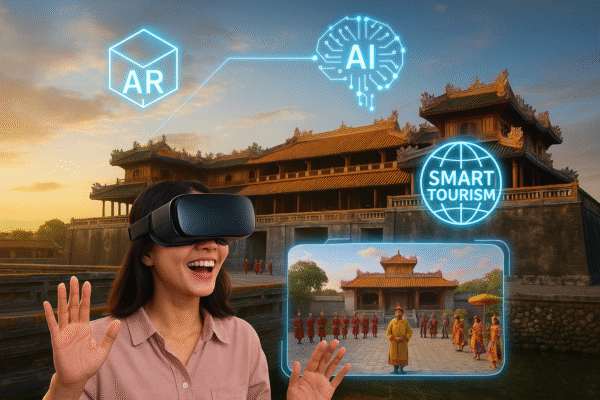Vietnam Accelerates Smart Tourism Transformation with AR and AI-Powered Experiences
Vietnam is entering a new era of digital travel as it fast-tracks smart tourism initiatives designed to enhance cultural immersion, traveler personalization, and sustainable growth. With augmented reality (AR), artificial intelligence (AI), and virtual reality (VR) increasingly woven into its tourism fabric, Vietnam is transforming historical landmarks and heritage experiences into interactive, tech-enhanced journeys that bridge the past and future.
Immersive Technologies Breathe Life into Heritage Sites
One of the most compelling applications of immersive technology is taking place in Hue, Vietnam’s ancient imperial capital. The Hue Monuments Conservation Centre recently launched the AR-powered initiative “Finding the Lost Imperial Palace,” allowing visitors to don Nreal Air glasses and step back into the Nguyen Dynasty. Guests experience digital reenactments of royal ceremonies at the Ngo Mon Gate and performances once held at the Duyet Thi Royal Theatre — all in their original locations.
This initiative doesn’t just visually reconstruct what was lost—it creates a multisensory, emotionally rich connection to Vietnam’s royal past. The project is a critical part of turning static ruins into living museums, drawing both domestic and international interest.
AR Tourism Expands to Rural and Natural Destinations
South of Hue, in Quang Tri Province, digital innovation is making cultural heritage more accessible. In collaboration with MobiFone and the provincial Department of Culture, Sports, and Tourism, efforts are underway to digitize iconic sites including Phong Nha-Ke Bang National Park — a UNESCO World Heritage Site — and culturally significant ethnic minority villages.
Visitors can now access 360-degree views, 3D mapping, and interactive VR tours via mobile apps or web platforms. These digital tools provide a new window into Vietnam’s lesser-visited destinations, making them more appealing to international travelers while preserving physical sites from over-tourism.
Travel Planning Enters the Age of Artificial Intelligence
According to local tour operators, AI is redefining how travel is planned in Vietnam. Where once human travel agents crafted custom itineraries, AI systems now generate ultra-personalized travel plans based on user preferences, real-time availability, seasonal patterns, and budget constraints.
Nguyen Tien Dat, CEO of AZA Travel, noted that artificial intelligence is enhancing the way tour packages are assembled. AI not only saves time but increases accuracy and satisfaction for travelers, a significant competitive advantage for Vietnam’s evolving tourism industry.
Smart Tourism Platforms Make Travel More Accessible
Vietnam’s national tourism strategy includes plans to build a comprehensive smart tourism ecosystem by 2030, according to the Vietnam National Administration of Tourism (VNAT). This digital-first approach prioritizes seamless booking experiences, mobile itinerary management, and virtual previews of attractions — all accessible from smartphones.
Visitors can already explore virtual showrooms, experience museums in VR, and use AI-powered apps for translation, navigation, and real-time destination insights. These tools aim to reduce friction in the travel process while enhancing engagement, especially for tech-savvy Gen Z and millennial travelers.
Enhancing Inclusivity and Accessibility
While Vietnam’s younger population is quick to adopt immersive travel tools, officials recognize that digital transformation must also be inclusive. Many tourism apps and platforms are being redesigned with simplified user interfaces and multi-language support to accommodate older travelers and international audiences.
By merging AR and VR with human storytelling — often provided by guides who act as cultural interpreters — Vietnam’s tourism industry is avoiding full automation in favor of richer, hybrid experiences. This human-tech synergy preserves authenticity while embracing innovation.
Preparing for the 2025 AR Tourism Surge
Analysts believe 2025 will be a tipping point for AR integration into global tourism, much like QR codes became standard during the COVID-19 pandemic. Lightweight AR glasses and mobile-compatible VR tools are becoming more affordable and user-friendly, accelerating adoption among mainstream travelers.
Vietnam is well positioned to benefit from this global trend, especially with pilot programs already showing success in Hue and Quang Tri. These immersive tools not only provide vivid digital experiences but also inspire future physical visits by sparking curiosity and emotional engagement.
Sustainability and Smart Tourism Go Hand in Hand
Vietnam’s smart tourism strategy is deeply intertwined with its sustainability goals. By using AR and VR to reduce the environmental footprint of mass tourism, the country can protect fragile ecosystems and heritage sites while still promoting growth.
Additionally, digital promotion of lesser-known destinations helps distribute tourist traffic beyond hotspots like Hanoi and Ho Chi Minh City, creating new economic opportunities in rural regions and reducing pressure on over-visited sites.
Future Outlook: Vietnam as Southeast Asia’s Smart Tourism Leader
Vietnam’s digital transformation roadmap, supported by state policy and private-sector collaboration, is positioning the country as a pioneer of next-generation tourism in Southeast Asia. By combining immersive technology, AI-driven customization, and inclusive digital platforms, Vietnam aims to attract 50 million international visitors annually by 2030.
Challenges remain in infrastructure development and digital literacy, but the momentum is strong. With ongoing investment, capacity-building, and innovation, Vietnam is on track to become a model for how emerging markets can leapfrog into the future of tourism through smart, sustainable, and story-driven experiences.
For more travel news like this, keep reading Global Travel Wire



















